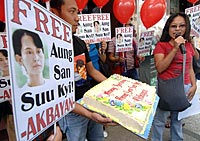




WASHINGTON—A Burmese journalist who won an international award for press freedom has described how he was tortured by prison authorities during his eight-year jail term.
An intelligence agent came to me and asked me a lot of questions like who else knew about this apart from my family, and who else I told about the award. The prison warden also hinted that I could be released soon.
Thaung Tun, an editor, reporter, and poet who is also known by his pen name Nyein Thit, received the 2006 Press Freedom Award by the New York-based Committee to Protect Journalists (CPJ).
He is best known for producing video documentaries that show the harsh realities of life under Burma’s military regime, including footage of forced labor.
“We were not jailed for taking video shots but because we had written articles and poems in some publications published by democratic forces whom the junta had declared outlawed groups,” he told RFA’s Burmese service in a recent interview.
“In those articles and poems, we called for the results of the 1990 election to be respected, and for a parliament to be formed according to the results of the 1990 elections,” he said.
Aung San Suu Kyi’s opposition party, the National League for Democracy (NLD), won national elections on May 27, 1990, but Burma’s military regime ignored the result.
It has instead suppressed political opposition over the years through lengthy jail terms and government-sponsored violence. Aung San Suu Kyi, a Nobel peace laureate, remains under house arrest in Rangoon.
Thaung Tun was sentenced to eight years’ imprisonment in October 1999. During his sentence, which he served in Moulmein Prison, he said he was interrogated continually over a 24-day period.
“I was tortured in various ways, like being forced to stand all through the night with my hands tied, or they would roll my shins with a grass roller, forcing me to kneel down on small pieces of broken glass,” he said.
He said healthcare facilities for prisoners were poor, with prescription drugs sometimes taking weeks to order.
But he noticed that the torture sessions began to diminish after he received the news of the CPJ award from his family during a prison visit.
“After that an intelligence agent came to me and asked me a lot of questions like who else knew about this apart from my family, and who else I told about the award. The prison warden also hinted that I could be released soon,” he said.
Thaung Tun was freed along with nearly 3,000 prisoners ahead of Burmese Independence Day on Jan. 8.
According to the CPJ, Burma was the fifth leading jailer of journalists in the world before Thaung Tun’s release. Among those imprisoned is 77-year-old U Win Tin, who has served more than 17 years on various anti-state charges.
Most recently, the military junta sentenced journalists Thaung Sein and Ko Kyaw Thwin to three years in prison in March 2005 for videotaping on the outskirts of the country’s restricted new capital, Pyinmana.
“We applaud the release of our colleague Thaung Tun, but we call on the Burmese government to free the six journalists still being held,” Joel Simon, executive director of the Committee to Protect Journalists, said in a statement issued upon Thaung Tun's release.
Original reporting in Burmese by Kyaw Min Htun. Written for the Web in English by Luisetta Mudie. Edited by Sarah Jackson-Han.